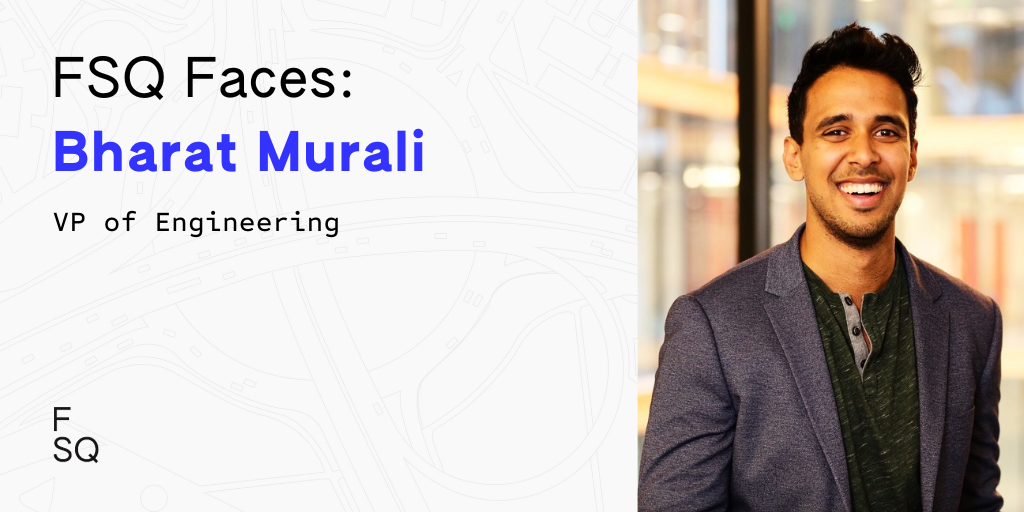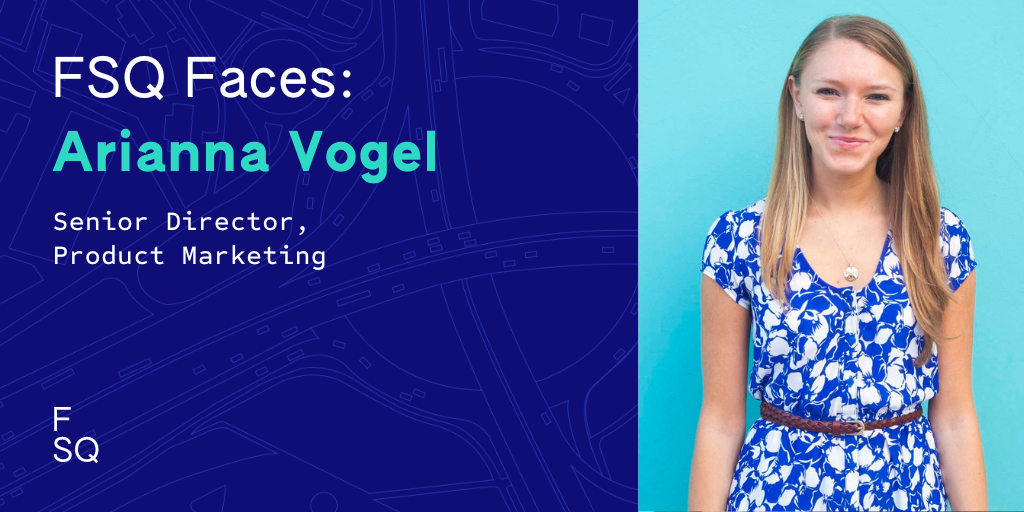We are excited to announce that Bharat Murali has joined Foursquare as our newest VP of Engineering! Learn more about Bharat’s experience in this edition of FSQ Faces.
Can you tell us about your background and experience in the tech industry, and how it has prepared you for this new role?
I’ve had the privilege of working for a couple of wonderful companies early in my career – at Microsoft and Twilio. As you might imagine, Microsoft gave me a peek at how large technology companies operate at scale. The eight years I spent at Twilio, on the other hand, were foundational in showing me how to scale a software business. That experience has taught me most of what I know today about engineering leadership.
The lesson that has stuck with me from my time at Twilio is the value of a strong culture in an organization. I was a beneficiary of the tremendous engineering culture at the company at large, where customer obsession and an unrelenting focus on quality were standards – not aspirations. Everyone around me lived and breathed the same values. It was understood that the responsibilities of delivering a high quality bar, operating with transparency, and exhibiting technical excellence were not limited to a few leaders, but rather shared across everyone in the organization. Organizations constantly change and evolve. The strength of the culture that roots its people is what determines how quickly the organization is able to adapt and execute to the changing environment.
This is why, in this new role as VP Engineering role at Foursquare, culture takes centerstage. And by that I don’t mean changing it, but rather preserving the parts of Foursquare that make it unique while driving a high bar for technical excellence, transparency, and quality.
What inspired you to join Foursquare, and what do you find most exciting about the opportunities and challenges that lie ahead?
Foursquare offers me a unique opportunity to lead a transformational journey in a space that is ripe for innovation, while taking on the challenge of navigating the complexities of geospatial tech.
I’m also inspired by Foursquare’s story. The company rode the social media wave of the early 2010s before making a bold decision to pivot (which they did successfully!) when the space got crowded and contentious. I deeply respect the part of the Foursquare DNA that isn’t afraid to reinvent itself and take big swings in order to deliver meaningful value. I’m excited to be a part of Foursquare while we take those big swings.
With this unique opportunity comes unique challenges. Transformational change comes with new addressable markets and new business requirements, which in turn require new ways of operating and new standards to achieve. I’m excited about discovering that frontier and building a team that drives toward making it real.
In your experience, what are some common challenges engineering teams face as they scale, and what strategies have you used to address these challenges in the past?
Engineering teams face no shortage of technical, organizational, and cultural challenges as they scale. If I had to condense the two most important potential long term risks to any fast-growing engineering organization, they’d be 1) the natural tendency towards creating organizational silos, and 2) the slow, invisible loss of identity and culture.
As teams scale, leaders tend to break them down into smaller, more-agile sub-teams. Each of those teams will likely have their own mission, scope of ownership, and KPIs to drive accountability to a more granular level. The challenge is that teams are incentivized to, and therefore tend to, locally optimize, thereby building fragmented solutions that ultimately don’t provide holistic customer value.
Over time, these silos also create bottlenecks that create an even more concerning challenge. In the name of maintaining more localized control, teams might desire to reinvent every part of its business (identity and billing, for example) within each of these silos. If this proliferates, it might even pave the way to a culture of empire building and politicking, effectively eroding whatever identity and culture the company might have built over the years past.
Three principles that are critical in creating strategies to address these.
- Developing a culture of deep customer empathy.
- Driving context and clarity over control.
- Adhering to core values without compromise – especially when building a team.
While these are simplifications, empowering an organization to value these tenets will help build and scale an engineering team sustainably.
What is your leadership philosophy, and how do you plan to foster a strong and innovative engineering team within our organization?
As is often the answer to any technical question: it depends.
I’ve heard people often subscribe to a single style of leadership. For example, “Oh, I am absolutely a servant leader.” I find that somewhat limiting, and think the various different leadership philosophies all have their merit. The complexity – and what separates the great leaders from the good ones – is in knowing when to apply which style.
While I’m here, my hope is to pair bottom-up leadership, through a culture of ownership, accountability and trust, with top-down clarity and transparency. I believe that creating an organization of growth-minded leaders across every level is the best way to ensure that we continuously raise the bar.
What’s the best advice you’ve ever received?
This might be a bit of a cliche, but it was my college professor’s mantra of “getting 1% better everyday.” I love this advice for two reasons.
First, it emphasizes quantification. What does good look like? Then, it implies that you must be able to measure it. In my experience, going through this exercise provides 90% of the value in itself. Second, it promotes the idea of small, compounding wins. Hard work very rarely means doing the highly complex thing once – rather, it’s taking the simple actions many, many, many times.
When employees join Foursquare, they’re always asked to share a fun fact. What would your fun fact be?
I recently got my 15 minutes of fame when I “taught” Jim Cramer (the host of Mad Money on CNBC) how to code.
I founded and was running a program at Twilio that taught everyone at the company how to build their first Twilio app, with the goal of developing deep customer empathy within every role at the company. When Jim Cramer caught wind of it, he was intrigued and wanted to feature it on his show.
I had an incredibly fun experience showing him the ropes of basic software development and working with him to build his first Twilio app. He eventually demoed his app in front of the company and aired it on his show, giving me a completely unexpected American TV debut.



